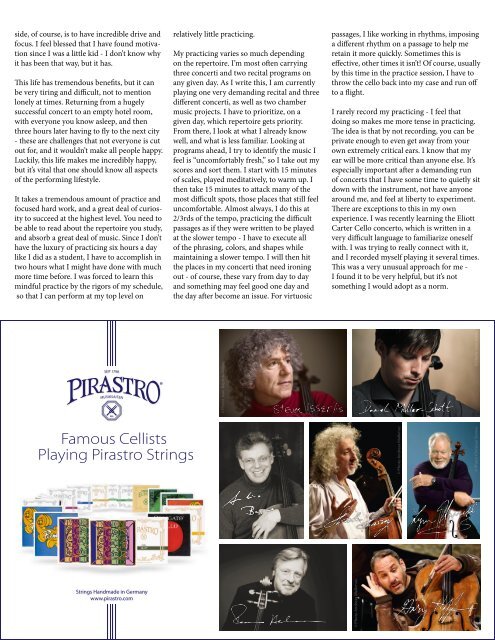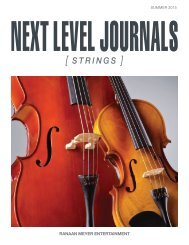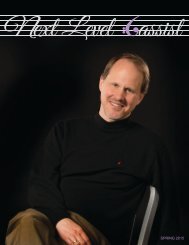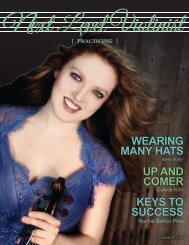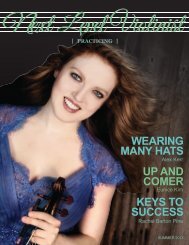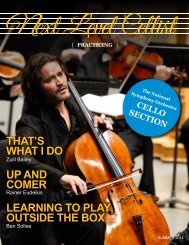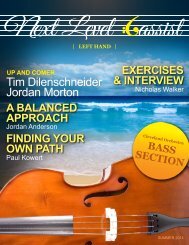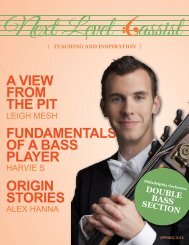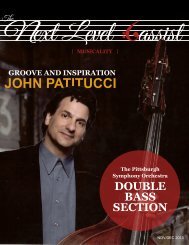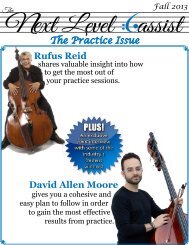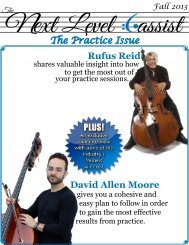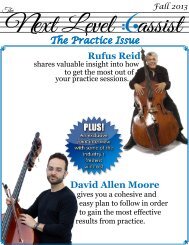Next Level Cellist Musicality Issue
Featuring articles by Alisa Weilerstein and Efe Baltacigil, a spotlight on the Chicago Symphony Cello section, and a duet by Ranaan Meyer
Featuring articles by Alisa Weilerstein and Efe Baltacigil, a spotlight on the Chicago Symphony Cello section, and a duet by Ranaan Meyer
Create successful ePaper yourself
Turn your PDF publications into a flip-book with our unique Google optimized e-Paper software.
side, of course, is to have incredible drive and<br />
focus. I feel blessed that I have found motivation<br />
since I was a little kid - I don’t know why<br />
it has been that way, but it has.<br />
This life has tremendous benefits, but it can<br />
be very tiring and difficult, not to mention<br />
lonely at times. Returning from a hugely<br />
successful concert to an empty hotel room,<br />
with everyone you know asleep, and then<br />
three hours later having to fly to the next city<br />
- these are challenges that not everyone is cut<br />
out for, and it wouldn’t make all people happy.<br />
Luckily, this life makes me incredibly happy,<br />
but it’s vital that one should know all aspects<br />
of the performing lifestyle.<br />
It takes a tremendous amount of practice and<br />
focused hard work, and a great deal of curiosity<br />
to succeed at the highest level. You need to<br />
be able to read about the repertoire you study,<br />
and absorb a great deal of music. Since I don’t<br />
have the luxury of practicing six hours a day<br />
like I did as a student, I have to accomplish in<br />
two hours what I might have done with much<br />
more time before. I was forced to learn this<br />
mindful practice by the rigors of my schedule,<br />
so that I can perform at my top level on<br />
relatively little practicing.<br />
My practicing varies so much depending<br />
on the repertoire. I’m most often carrying<br />
three concerti and two recital programs on<br />
any given day. As I write this, I am currently<br />
playing one very demanding recital and three<br />
different concerti, as well as two chamber<br />
music projects. I have to prioritize, on a<br />
given day, which repertoire gets priority.<br />
From there, I look at what I already know<br />
well, and what is less familiar. Looking at<br />
programs ahead, I try to identify the music I<br />
feel is “uncomfortably fresh,” so I take out my<br />
scores and sort them. I start with 15 minutes<br />
of scales, played meditatively, to warm up. I<br />
then take 15 minutes to attack many of the<br />
most difficult spots, those places that still feel<br />
uncomfortable. Almost always, I do this at<br />
2/3rds of the tempo, practicing the difficult<br />
passages as if they were written to be played<br />
at the slower tempo - I have to execute all<br />
of the phrasing, colors, and shapes while<br />
maintaining a slower tempo. I will then hit<br />
the places in my concerti that need ironing<br />
out - of course, these vary from day to day<br />
and something may feel good one day and<br />
the day after become an issue. For virtuosic<br />
passages, I like working in rhythms, imposing<br />
a different rhythm on a passage to help me<br />
retain it more quickly. Sometimes this is<br />
effective, other times it isn’t! Of course, usually<br />
by this time in the practice session, I have to<br />
throw the cello back into my case and run off<br />
to a flight.<br />
I rarely record my practicing - I feel that<br />
doing so makes me more tense in practicing.<br />
The idea is that by not recording, you can be<br />
private enough to even get away from your<br />
own extremely critical ears. I know that my<br />
ear will be more critical than anyone else. It’s<br />
especially important after a demanding run<br />
of concerts that I have some time to quietly sit<br />
down with the instrument, not have anyone<br />
around me, and feel at liberty to experiment.<br />
There are exceptions to this in my own<br />
experience. I was recently learning the Eliott<br />
Carter Cello concerto, which is written in a<br />
very difficult language to familiarize oneself<br />
with. I was trying to really connect with it,<br />
and I recorded myself playing it several times.<br />
This was a very unusual approach for me -<br />
I found it to be very helpful, but it’s not<br />
something I would adopt as a norm.<br />
© Photo Jean-Baptiste Millot<br />
© Photo Uwe Arens<br />
Famous <strong>Cellist</strong>s<br />
Playing Pirastro Strings<br />
© Photo Aloisia Behrbohm<br />
© Photo Andreas Malkmus<br />
© Photo Christian Steiner<br />
Strings Handmade in Germany<br />
www.pirastro.com<br />
8 SPRING 2014 NEXT LEVEL CELLIST<br />
© Photo Andreas Malkmus


